Unit 10 You're supposed to shake hands Section A(1a-2d)课件(共28张PPT)
文档属性
| 名称 | Unit 10 You're supposed to shake hands Section A(1a-2d)课件(共28张PPT) | 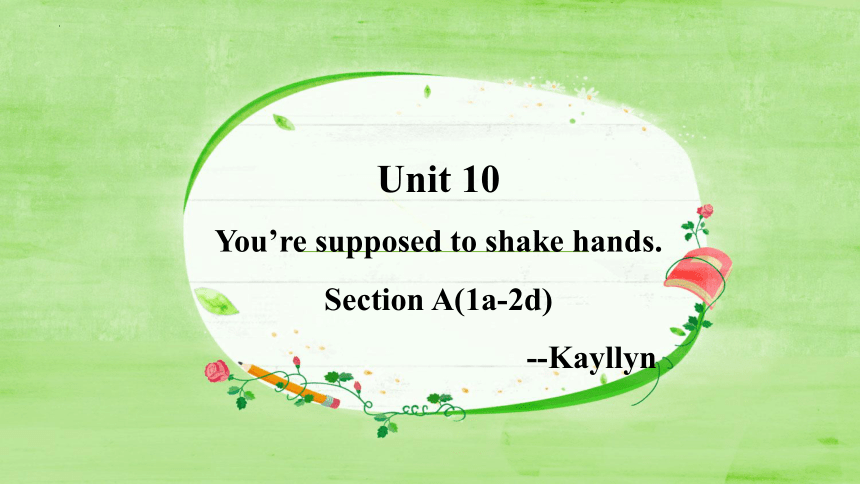 | |
| 格式 | pptx | ||
| 文件大小 | 52.0MB | ||
| 资源类型 | 教案 | ||
| 版本资源 | 人教新目标(Go for it)版 | ||
| 科目 | 英语 | ||
| 更新时间 | 2022-11-29 19:58:20 | ||
图片预览




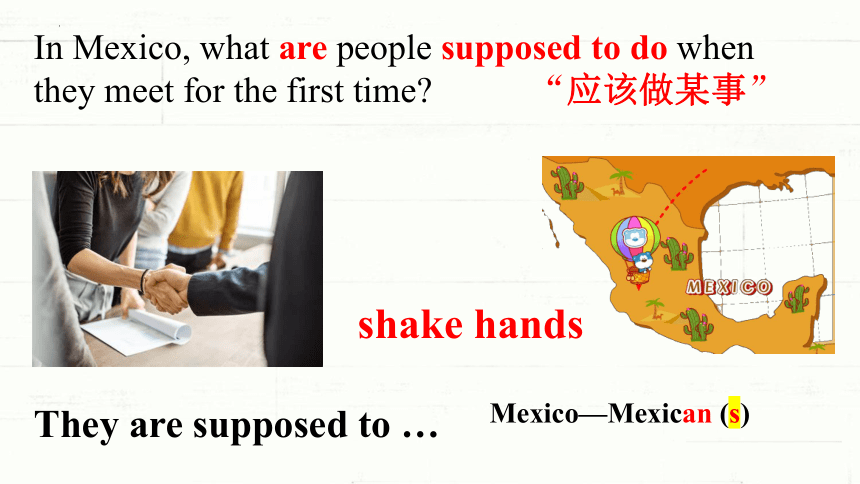
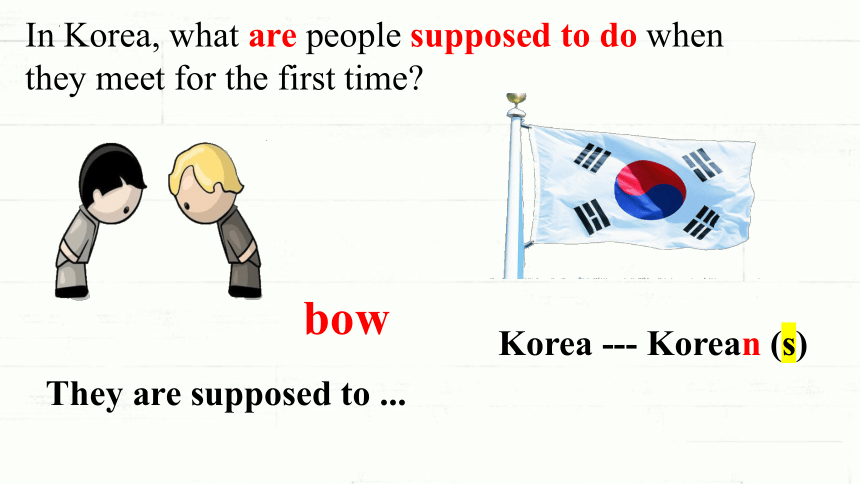
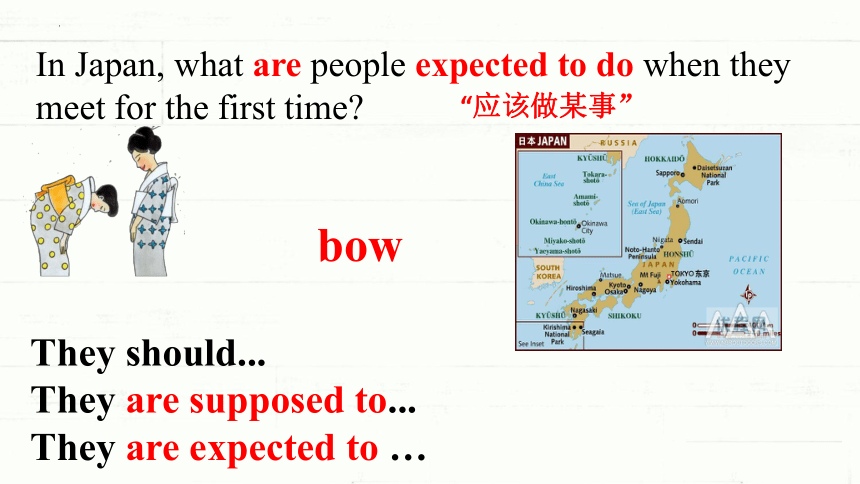
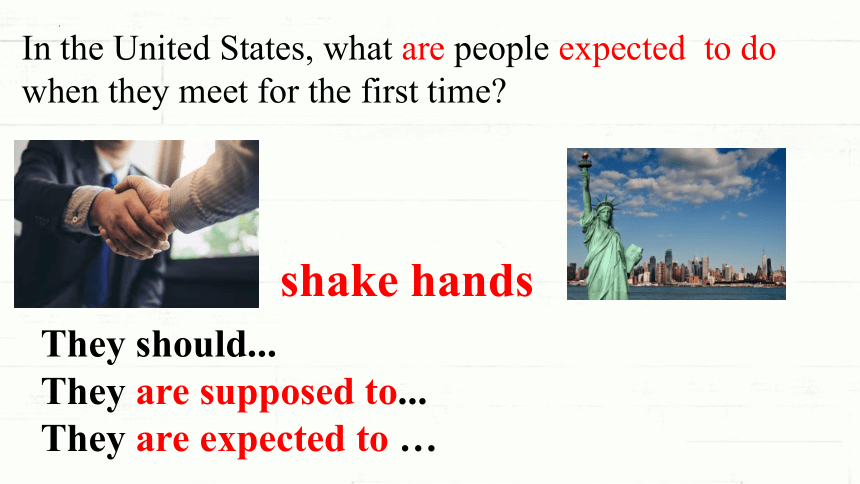
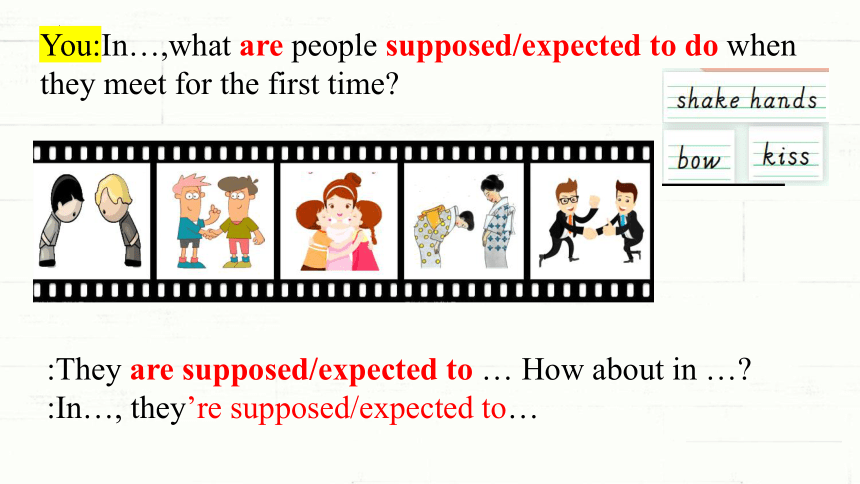
文档简介
(共28张PPT)
Unit 10
You’re supposed to shake hands.
Section A(1a-2d)
--Kayllyn
We’ll hold a welcome party at 7. pm for exchange students.
Do you know how to greet foreigners
What kinds of greeting manners are mentioned in the video
Pre-listening
In Brazil, what should people do when they meet for the first time
Brazil --- Brazilian(s)
They should…
kiss
In Mexico, what are people supposed to do when they meet for the first time “应该做某事”
Mexico—Mexican (s)
They are supposed to …
shake hands
In Korea, what are people supposed to do when they meet for the first time
Korea --- Korean (s)
They are supposed to ...
bow
In Japan, what are people expected to do when they meet for the first time
“应该做某事”
They should...
They are supposed to...
They are expected to …
bow
In the United States, what are people expected to do when they meet for the first time
They should...
They are supposed to...
They are expected to …
shake hands
You:In…,what are people supposed/expected to do when they meet for the first time
:They are supposed/expected to … How about in …
:In…, they’re supposed/expected to…
While-listening
Listen and check your answers in 1a.
Countries Customs
1. ______ Brazil (巴西) a. bow
b. shake hands
c. kiss
2. ______ the United States
3. ______ Japan
4. ______ Mexico (墨西哥)
5. ______ Korea
c
b
a
b
a
In South America, people are supposed to ______.
hug
Do you know more
In India, people are supposed to ___________________ in front of the chest.
put palms together
Do you know more
The Maori people are supposed to ______________.
touch noses
Do you know more
We are supposed to know some customs about other countries.
Or we will
make some mistakes!
Maria is an exchange student in America.
Look at the picture and tell what’s happening
Pre-listening
2a Listen for the general information.
Maria is an exchange student. Last night she had dinner at an American friend’s house.
1.What kind of party is it
A. an indoor party. B. An outdoor party.
2. What time did Maria arrive at the party
A. 7:00 B.8:00
3. How did Maria greet Paul’s mom
A. She shook her hands. B. She bowed. C. She kissed her.
4. What did Maria wear at the party
A. A T-shirt. B. A fancy dress. C. A skirt.
Maria’s mistakes
______ arrived late
______ ate the wrong food
______ greeted Paul’s mother the wrong way
______ wore the wrong clothes
While-listening
Listen and check the mistakes Maria made.
√
√
√
Tips:catch the key words
1. Maria was supposed to arrive at 7:00, but she
_______________.
2. In Maria’s country, when you’re invited for 7:00, you’re expected to ____________.
3. When Maria met Paul’s mom, she was supposed to ___________.
4. Maria should ask what she is supposed to __________ if she is invited to a party next time.
arrived at 8:00
come later
shake hands
wear
Tips:write one or two letters of each word.
While-listening
Listen and fill in the blanks.
Post-listening
Is Maria supposed to arrive on time
Yes, she is.
Is she supposed to wear a dress
No, she isn’t. She isn’t supposed to wear a dress.
Is she supposed to kiss Paul's mother
No, she isn’t. She isn’t supposed to kiss. She is expected to shake hands.
John went to the welcome party for foreign students last night. He made some new friends. But something funny happened.
Listen and choose the best answer.
1. What did John do to greet Sato at last
A. Hold out his hand. B. Make a bow C. Kiss him on the face.
2.What did Katie do when she met Marie
A. Hold out her hand. B. Make a bow C. Kiss her on the face.
3.In Japan,people are expected to ________to greet each other.
A. shake hands. B. make a bow
C. Kiss each other on both sides of their faces.
4.In France,people are expected to________to greet each other.
A. shake hands. B. make a bow
C. kiss each other on both sides of their faces.
√
√
√
√
Katie: How was the welcome party for foreign students last night
John: Great! I made some new friends. But a funny thing happened.
Katie: What
John: I met a Japanese boy called Sato, and as soon as I held out my
hand, he bowed.
Katie: That’s how people in Japan are expected to greet each other.
It’s impolite if you don’t bow.
John: I didn’t know that. So I just stood there with my hand out. Finally,
I returned the bow.
Katie: I remember when I first met Marie last year, I did the same thing.
I held out my hand and to my surprise, she kissed me on both sides of my face!
John: I wouldn’t mind that!
Katie: Very funny. Later I found out French people are supposed to kiss
when they see each other.
I wasn’t expecting a visitor.
我没想到会有来访者。
I expect to see him tomorrow.
I expected my brother to help me carry the heavy box.
I expect that I can see you again.
Complete the sentences with the phrases in the box.
1. When you go abroad, it __________________ bring your passport.
2. After class, students _________________clean the chalk off the blackboard.
3. If you visit the northern coast of Norway during the winter season, it ______________ pack warm clothes.
4. If there are people in the meeting room, you ________________ knock before entering.
5. In many eastern European countries, you _________________take off your gloves before shaking hands.
be supposed to, be expected to, be important to
is important to
are supposed to
4a
is important to
are expected to
are supposed to
Fill in the blanks with the correct forms of the words in brackets.
Each country has different rules about social situations. A traveler ____________________(not expect; know) all of these, but it is helpful_______(learn) as many of these customs as possible. One of the best ways to be accepted in a foreign country is to try ______________ (understand) how people think. Learning what you _________________(suppose; do) and__________________(not suppose; do) in social situations may be difficult, but it is worth the trouble if you want to understand another culture.
isn’t expected to know
to learn
4b
to understand
are supposed to do
aren’t supposed to do
Thanks for listening
Unit 10
You’re supposed to shake hands.
Section A(1a-2d)
--Kayllyn
We’ll hold a welcome party at 7. pm for exchange students.
Do you know how to greet foreigners
What kinds of greeting manners are mentioned in the video
Pre-listening
In Brazil, what should people do when they meet for the first time
Brazil --- Brazilian(s)
They should…
kiss
In Mexico, what are people supposed to do when they meet for the first time “应该做某事”
Mexico—Mexican (s)
They are supposed to …
shake hands
In Korea, what are people supposed to do when they meet for the first time
Korea --- Korean (s)
They are supposed to ...
bow
In Japan, what are people expected to do when they meet for the first time
“应该做某事”
They should...
They are supposed to...
They are expected to …
bow
In the United States, what are people expected to do when they meet for the first time
They should...
They are supposed to...
They are expected to …
shake hands
You:In…,what are people supposed/expected to do when they meet for the first time
:They are supposed/expected to … How about in …
:In…, they’re supposed/expected to…
While-listening
Listen and check your answers in 1a.
Countries Customs
1. ______ Brazil (巴西) a. bow
b. shake hands
c. kiss
2. ______ the United States
3. ______ Japan
4. ______ Mexico (墨西哥)
5. ______ Korea
c
b
a
b
a
In South America, people are supposed to ______.
hug
Do you know more
In India, people are supposed to ___________________ in front of the chest.
put palms together
Do you know more
The Maori people are supposed to ______________.
touch noses
Do you know more
We are supposed to know some customs about other countries.
Or we will
make some mistakes!
Maria is an exchange student in America.
Look at the picture and tell what’s happening
Pre-listening
2a Listen for the general information.
Maria is an exchange student. Last night she had dinner at an American friend’s house.
1.What kind of party is it
A. an indoor party. B. An outdoor party.
2. What time did Maria arrive at the party
A. 7:00 B.8:00
3. How did Maria greet Paul’s mom
A. She shook her hands. B. She bowed. C. She kissed her.
4. What did Maria wear at the party
A. A T-shirt. B. A fancy dress. C. A skirt.
Maria’s mistakes
______ arrived late
______ ate the wrong food
______ greeted Paul’s mother the wrong way
______ wore the wrong clothes
While-listening
Listen and check the mistakes Maria made.
√
√
√
Tips:catch the key words
1. Maria was supposed to arrive at 7:00, but she
_______________.
2. In Maria’s country, when you’re invited for 7:00, you’re expected to ____________.
3. When Maria met Paul’s mom, she was supposed to ___________.
4. Maria should ask what she is supposed to __________ if she is invited to a party next time.
arrived at 8:00
come later
shake hands
wear
Tips:write one or two letters of each word.
While-listening
Listen and fill in the blanks.
Post-listening
Is Maria supposed to arrive on time
Yes, she is.
Is she supposed to wear a dress
No, she isn’t. She isn’t supposed to wear a dress.
Is she supposed to kiss Paul's mother
No, she isn’t. She isn’t supposed to kiss. She is expected to shake hands.
John went to the welcome party for foreign students last night. He made some new friends. But something funny happened.
Listen and choose the best answer.
1. What did John do to greet Sato at last
A. Hold out his hand. B. Make a bow C. Kiss him on the face.
2.What did Katie do when she met Marie
A. Hold out her hand. B. Make a bow C. Kiss her on the face.
3.In Japan,people are expected to ________to greet each other.
A. shake hands. B. make a bow
C. Kiss each other on both sides of their faces.
4.In France,people are expected to________to greet each other.
A. shake hands. B. make a bow
C. kiss each other on both sides of their faces.
√
√
√
√
Katie: How was the welcome party for foreign students last night
John: Great! I made some new friends. But a funny thing happened.
Katie: What
John: I met a Japanese boy called Sato, and as soon as I held out my
hand, he bowed.
Katie: That’s how people in Japan are expected to greet each other.
It’s impolite if you don’t bow.
John: I didn’t know that. So I just stood there with my hand out. Finally,
I returned the bow.
Katie: I remember when I first met Marie last year, I did the same thing.
I held out my hand and to my surprise, she kissed me on both sides of my face!
John: I wouldn’t mind that!
Katie: Very funny. Later I found out French people are supposed to kiss
when they see each other.
I wasn’t expecting a visitor.
我没想到会有来访者。
I expect to see him tomorrow.
I expected my brother to help me carry the heavy box.
I expect that I can see you again.
Complete the sentences with the phrases in the box.
1. When you go abroad, it __________________ bring your passport.
2. After class, students _________________clean the chalk off the blackboard.
3. If you visit the northern coast of Norway during the winter season, it ______________ pack warm clothes.
4. If there are people in the meeting room, you ________________ knock before entering.
5. In many eastern European countries, you _________________take off your gloves before shaking hands.
be supposed to, be expected to, be important to
is important to
are supposed to
4a
is important to
are expected to
are supposed to
Fill in the blanks with the correct forms of the words in brackets.
Each country has different rules about social situations. A traveler ____________________(not expect; know) all of these, but it is helpful_______(learn) as many of these customs as possible. One of the best ways to be accepted in a foreign country is to try ______________ (understand) how people think. Learning what you _________________(suppose; do) and__________________(not suppose; do) in social situations may be difficult, but it is worth the trouble if you want to understand another culture.
isn’t expected to know
to learn
4b
to understand
are supposed to do
aren’t supposed to do
Thanks for listening
同课章节目录
- Unit 1 How can we become good learners.
- Section A
- Section B
- Unit 2 I think that mooncakes are delicious!
- Section A
- Section B
- Unit 3 Could you please tell me where the restroom
- Section A
- Section B
- Unit 4 I used to be afraid of the dark.
- Section A
- Section B
- Unit 5 What are the shirts made of?
- Section A
- Section B
- Review of Units 1-5
- Unit 6 When was it invented?
- Section A
- Section B
- Unit 7 Teenagers should be allowed to choose their
- Section A
- Section B
- Unit 8 It must belong to Carla.
- Section A
- Section B
- Unit 9 I like music that I can dance to.
- Section A
- Section B
- Unit 10 You're supposed to shake hands.
- Section A
- Section B
- Review of Units 6-10
- Unit 11 Sad movies make me cry.
- Section A
- Section B
- Unit 12 Life is full of the unexpected
- Section A
- Section B
- Unit 13 We're trying to save the earth!
- Section A
- Section B
- Unit 14 I remember meeting all of you in Grade 7.
- Section A
- Section B
- Review of Units 11-14
